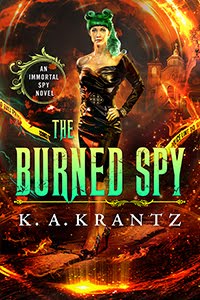This Week's Topic: Social Media Engagement
{steeples fingers}
{stares into camera}
Your time is a commodity. A very valuable one.
Your emotional investment is an undervalued yet critical commodity.
Not every commodity is measured in money.
There's a lot of advice on where, when, and how authors should engage with their audiences. There's even pressure from publishers of all sizes for authors to grow their audiences to the magical level of "influencer" (thus, making the author the owner of the marketing burden, aka the marketing costs). Taking on the social media challenge is all well and good for authors who enjoy virtual engagement, but there's a significant portion of authors who don't, and that's okay too.*
Social butterfly or not, the minimum requirement in the virtual space for an author is a website that lists your books, preferably by series then by reading order. That's it. No engagement necessary. Your website exists for readers who've stumbled on your work(s) and want to read more. All the other stuff that authors of small, medium, or large readerships have on their sites is there because the author either: a) has the time and desire to offer and maintain it, or b) pays someone else to do it for them. Either way, there is an out-of-pocket cost in cash and time.
If you want to be more aggressive, get your name out there, and develop an auto-buy readership, a robust social media presence is certainly one way to do it. However, understand that the pressure on authors to be active on social media comes from the misbegotten notion of "free advertising." Just because you're not paying money to exist in a virtual "public" space doesn't mean that you're not paying in opportunity costs, in your time, or in your emotional capacity. Lots of writers prefer to spend those resources on writing their next book. Is engaging in social media a direct 1:1 cost exchange for a writer? Of course not. Your personal resource values are unique to you, and only you can truly know the costs.
For some authors, it's cheaper to pay big platforms like Facebook, Amazon, or Bookbub to run ads than it is to build brand awareness and loyalty through social media. It's certainly easier to measure ROI on an ad campaign than on a Discord server.
Don't allow external pressures to force you to do more than you can afford, be it in finances, time, or health.
By contrast, be aware that the less effort you put forth, the fewer sales you get.
When it comes to social media,
you should do what enjoy
and discard all that gives you angst.
*Note: If you're under contract with a publisher, be sure to read and, if necessary, modify any clauses that stipulate your web presence and/or participation. You don't want to be in breach of contract just because Instagram is an anathema to you.







